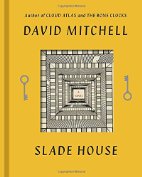October 30, 2015
One thinks of Hawthorne’s dictum about a book that takes the name of “Romance.” The definition of his day (please don’t think of modern-day bodice-busters) held that a Romance could play faster and looser with facts and with fictional effects than could the more demanding Novel, in which characters and events would have to conform to a more exacting standard. At the outset of The Little Paris Bookshop author Nina George introduces us to Jean Perdu (yes, John Lost). He has grieved for the last twenty years that the love of his life has left him.
"The Little Paris Bookshop" by Nina George
One thinks of Hawthorne’s dictum about a book that takes the name of “Romance.” The definition of his day (please don’t think of modern-day bodice-busters) held that a Romance could play faster and looser with facts and with fictional effects than could the more demanding Novel, in which characters and events would have to conform to a more exacting standard. At the outset of The Little Paris Bookshop author Nina George introduces us to Jean Perdu (yes, John Lost). He has grieved for the last twenty years that the love of his life has left him.
October 27, 2015
It appears this soul-sucking story had more legs and arms and disposable bodies than David Mitchell could get rid of in The Bone Clocks. This piece comes to us as the mantissa to Mitchell’s acclaimed novel published earlier this year. It’s come out just in time for Halloween, and it’s yet another highly professional set of pyrotechnics.
"Slade House" by David Mitchell
It appears this soul-sucking story had more legs and arms and disposable bodies than David Mitchell could get rid of in The Bone Clocks. This piece comes to us as the mantissa to Mitchell’s acclaimed novel published earlier this year. It’s come out just in time for Halloween, and it’s yet another highly professional set of pyrotechnics.
The author revisits Dr Marinus from Bone Clocks, and this time she carries out her vigilante justice against the Grayer twins, who have lived for 120 years or so … These are spooky tales with spooky effects, always carried off with assurance to spare, but I begin to wonder if Mr. Mitchell is approaching something a little deeper, about our fear of death and longing for immortality. But these companion-pieces seem too dependent on fun special effects and thrilling plot twists to try to pin anything more on them. He has always sailed very close to a current of fairness and moral behavior - see Cloud Atlas and The Thousand Autumns of Jacob de Zoet - and this pint-and-half pint of stories has the same slant.
I liked Slade House. Its closeups of characters before they’re dispatched have great verisimilitude to lives lived and emotions suffered, and the spooky effects are pulled off well. This book does feature a badass hero giving the normal comeuppance to a couple of dirtbags; the whole amounts to an exercise in waiting for this payoff. I expect Mr. Mitchell’s next effort will be on new topics, with new characters (well, maybe not all new), and different metaphysics.
October 20, 2015
"Daughter of Fortune" by Isabel Allende
Translated from the Spanish by Margaret Sayers Peden
In Daughter of Fortune Isabel Allende has crafted an epic novel of change. Many, if not most, novels feature change in their characters, but in Daughter everything changes: the main characters, the principal mode of oceangoing transportation, the United States, San Francisco, science, the press - you name it. This full, diverting novel is a paroxysm of change.
And where better to set such fiction than in Gold Rush California, a setting and metaphor for wrenching alteration if there ever was one? The prime and preeminent change occurs in fifteen year-old Eliza Summers in Valparaiso, a small, stultifying port on the Chilean coast. The year is 1847, and Eliza has just been stunned into rapture by the existence of Joaquin, her uncle’s employee, when he supervises delivery of goods to her home. This captivated glance evolves into a clandestine affair and Eliza ends up stowed away on a sailing ship - to the Gold Rush in California - as she chases after her errant lover. It nearly costs her her life.
Ms. Allende has skillfully put together a highly enjoyable epic of historical California. It’s a pastiche in which many of the epoch’s stock characters make an appearance: the heavyset madam with the heart of gold; the upstanding Quaker blacksmith who falls for a “soiled dove”; the yellow press journalist who deals more in fiction than fact. But the pastiche forms a mere backdrop for the drama unfolding in the lives of the two highly sympathetic main characters, Eliza and her friend, Tao Chi’en. That, and the human face she effectively places on the legendary Gold Rush. In Daughter of Fortune the racism, genocide, greed run amok, frontier “justice,” excessive and grasping paranoia, all get a full treatment. Then, the inexorable change to more reliable wealth - mercantilism, the professions, construction, and the sometimes deceiving trappings of civilization find their way into this nuanced and encyclopedic work.
Extra praise belongs to Ms. Allende’s conclusion. She sets every necessary trend and direction into place, and simply lets us imagine it. This is lovely, sweeping, and balanced - a unique and highly recommended combination.
October 03, 2015





















